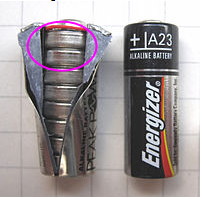Could someone recommend a small-sized battery 3V battery that could sustain 15mA ?
Could someone recommend a small-sized battery 3V battery that could sustain 15mA current for several seconds?
Our application requires two RF end device to occasionally establish some connection, so that when A is transmitting, B needs to be in receiving mode. Although A?s transmission could be in brief pulses so that is would work with a CR2032 battery, B?s receiving mode cannot operate in receiving mode since this will lose most of the pulses from A.
For B to operate in receiving mode it would require a current of 15mA, and it should last at least for a few seconds (3~5). If we use CR2032 which has continuous rating of 0.2mA and pulse current rating of 15mA, how long can the 15mA current be supplied? I wonder if more three seconds is too long for it?
We also looked for non-coin batteries which are larger. There is a comprehensive list at http://en.wikipedia.org/wiki/List_of_battery_sizes. We examined:
? A23 battery: It has voltage of 12V > 3V we require, and has no problem of supplying 15mA current for extend period as shown by Energizer A23. However although its voltage is 12V, according to Wikipedia it is stacked up by 8 cells so I believe each individual cell should have voltage 1.5V. Then can we unwrap an A23 battery and put two of its cells together to reach nominal voltage of 3V, while still allowing 15mA continuous current?

We are especially interested in exploring the possibility of reassembling two of A23?s 8 cells to reach both our current and voltage requirement. Could someone help?
Bob
I'd contact Duracel and Panasonic and ask for advice. They would be able to tell you whether 3 seconds is too long. If, the current limit is only due to heat being generated in the battery due to the internal resistance, then I doubt 3s would be too long. But I'm no battery expert.
This is not the most appropiate forum for this question. There is a forum on here about "power", but perhaps others are more suitable. The fact you are using a transmitter and receiver does not really mean this question has anything to do with antennas, RF or optics.
Dave
using a (rather big value) capacitor as a "power reserve"?
Dave,
I think what you said makes sense. This essentially is more a battery question. I will ask the manufacturers.
Bob
- - - Updated - - -
bepobalote,
I don't know how to quantitatively calculate it. Some rather big caps although reserves more power, their response in discharging is not fast enough as small caps.
Sorry, but I do not understand what you are meaning (in regards your application).
I don't think that will achieve anything useful, since as soon as he depletes charge from the capacitor, the battery will be trying to charge up the capacitor.
It might work if he had a large capacitor, with a series resistor to the battery, so the battery only charges the capacitor slowly, but the voltage for his application is supplied by the capacitor. But really, that is going to have to use large components. I don't think it is too practical.
Best answer on your question you can get on several ways: To ask someone who done this before, to ask manufacturer, to read battery datasheets and see discharging graphs, or to make own experiment with sacrifice of few batteries.
Only if you can be sure each individual cell is secure in a rigid housing, the same way as cells purchased individually.
I have disassembled 9V batteries and found 6 narrow cylindrical cells. The shell was smooth and had no printing.
I tried storing some in hope of using them in threes, as a cheap way to obtain 4.5 V.
However they eventually would pop open, making a loud report like a firecracker.
They were under internal pressure, and were no longer bound in their outer steel jacket.
As someone already recommended, the manufacturer can advise you best.
For comparison, there are small LED flashlights which use two button cells. They last longer than a few seconds. I don't know if they put out as much as 15 mA, however.
